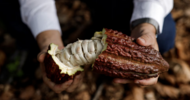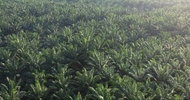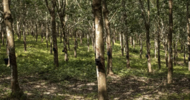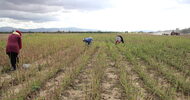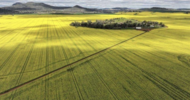When will governments recognise the immense potential of their own farmers and their sustainable, diverse family farming systems, that are so desperately in need of genuine 'responsible' agricultural investment to assure food and seed sovereignty, asks Joan Baxter
El año 2017 terminó como uno de los más fatídicos para los defensores de la tierra. También fue un año muy malo para muchos acaparadores de tierras.
A New York company managing the retirement savings of workers in Sweden, the US and Canada is evading Brazilian laws on foreign investment to acquire farmlands from a businessman accused of violently displacing local communities.
A slide show by GRAIN that profiles some of those who have been most actively pursuing or supporting farmland grabs around the world.
An international coalition of NGOs and research groups has published the world's largest database of land grab deals struck since 2000, offering unprecedented detail on who's investing, where and what for.
- The Guardian
-
27 April 2012
The handful of companies that control industrial palm oil production in West and Central Africa have been linked to numerous social and environmental impacts, violating their buyers’ NDPE commitments.
The largest landowners in Serbia are Matijevic Meat Industry, Al Dahra (UAE), Delta Holding, Almex, Login EKO, Coric Agrar, Mile Blagojevic, Elite Agro (UAE), Al Rawafed (UAE) and Nicko, Forbes Serbia reports
- Beta Briefing
-
22 February 2024
Researchers say the construction of a dam and sugarcane plantations has dispossessed the Lower Omo’s peoples of their farming and grazing lands and irreversibly altered the natural cycles of the Omo River.
L’année 2017 s’est avérée l’une des années les plus mortelles pour les défenseurs des terres. L’année a été assez mauvaise aussi pour plusieurs accapareurs de terres.
The project leaders of Wanbao Africa Agriculture Development Limited seemed to have an emerging-market hubris every bit as blinding as that of their colonial predecessors.
China ha aceptado firmar tratados comerciales que la obligan a importar alimentos, y ha implementado políticas que favorecen el desarrollo de fincas de mayor tamaño y de inmensas corporaciones del agronegocio y la alimentación
La Chine a accepté des accords commerciaux qui obligent le pays à importer des denrées alimentaires et mis en place des mesures favorisant le développement des grandes exploitations et d’énormes entreprises alimentaires et agroindustrielles.
Over the past couple of decades, China has embraced trade agreements that oblige it to import foods and implemented policies that favour the development of larger farms and massive agribusiness and food corporations.
How did such a promising idea (which appeared to offer a textbook example of a win-win situation) fail?
The G77 and China have alerted the UN General Assembly to the emerging trend of “massive acquisition by large investors from developed countries of farm land in developing countries”. The farm land is being bought not for food security, but for the speculative purpose of future agricultural production, which thus creates a significant added burden to food insecurity globally.
Australians do realise the value of what is being sold, a land agent and rural property specialist said, "but their hands are tied because they can't raise the money".
Largely inspired by this website, Joseph Grima, Jeffrey Johnson and José Esparza have created a farm in the middle of an urban square in Shenzhen called Landgrab City.
Some of the world's largest pension funds bet big on Brazilian farmland. Communities, and the climate, are paying the price
Thousands of families are being violently evicted from their farms to make way for foreign-owned plantations in Kiryandongo, Uganda.
- Witness Radio et al
-
25 August 2020
Award-winning Cameroonian journalist Madeleine Ngeunga and Fern’s Indra Van Gisbergen recently visited villages in the shadow of Socapalm’s oil palm plantations to see if issues driving the dispute between locals and the company are being resolved.
Corporations and bankers do not believe in farming as a way of life; they believe in farming as a very profitable business that they control. Their goal is not to improve family farming in Africa, but to eradicate it.
An official claims that three land activists in Cambodia, detained on suspicion of conspiring to overthrow the government, had intended to incite a peasant uprising by educating farmers on the wealth and poverty divide
One of the Ukraine's largest farmland owners says "ongoing changes" in Ukraine - which last month signed a political association with the European Union – would "lead to the fundamental transformation of the country".
Africa is regarded as the New Eldorado, and is attracting many foreign based private or public investment companies, sovereign wealth funds and even pension funds gradually. Sadly, while foreigners continue to play a major role in growth investments, African pension funds' contributions to this growth are dismal.
- Huffington Post
-
17 November 2012
Videos from the International Conference on Global Land Grabbing, Institute for Development Studies, University of Sussex, UK, 6 - 8 April 2011
The global boom in commodities has raised the profile of three Asian agribusinesses: Olam, Wilmar and Noble, all with important farmland holdings.
Event aims to support “win-win” arrangements whereby investors and host countries can both benefit from international investment, supporting national or regional food security aims.
- US and Japanese Governments
-
12 April 2010
Witness Radio has documented 181 cases of arbitrary arrests, detentions, imprisonments, disappearances, and other retaliatory attacks, highlighting a concerning trend in Uganda’s agricultural sector, which is marked by a significant increase in violent and retaliatory attacks and detentions.
- Witness Radio
-
19 Mar 2024
The expansion of industrial agriculture in Brazil has been an international affair, linking pension funds, university endowments, and major financial actors across the world.
- Phenomenal World
-
28 May 2022
The heavily forested Sangha region in the Republic of Congo is almost entirely occupied by three concessions, including one held by the palm oil company Eco-Oil Energie SA.






